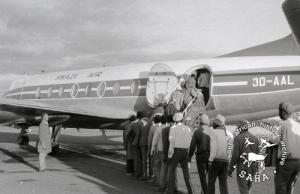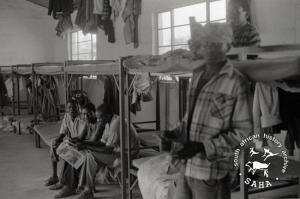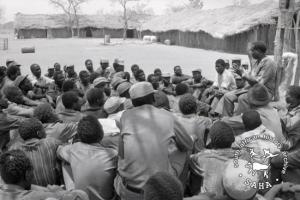 Many of those interviewed spoke about how they joined the struggle, what attracted them, and how they journeyed out of the country. Most passed through Botswana, and some of the photographs which relate to recruitment were taken at Francistown transit camp, close to Zimbabwe's western border. Others were taken at Nampundwe in Zambia, where new recruits were sorted out after they were flown to Zambia from Botswana.
Many of those interviewed spoke about how they joined the struggle, what attracted them, and how they journeyed out of the country. Most passed through Botswana, and some of the photographs which relate to recruitment were taken at Francistown transit camp, close to Zimbabwe's western border. Others were taken at Nampundwe in Zambia, where new recruits were sorted out after they were flown to Zambia from Botswana.
The photographs were taken in the late 1970s when there were large numbers of military recruits as well as refugees flooding to Zambia. One interviewee, Precious Nleya, was asked specifically about Francistown, while another spoke specifically about Nampundwe, but all had something to say about how they joined the struggle.
Many joined the struggle much earlier. Some, like Amos Ngwenya, were first acquainted with ZAPU in South Africa; others were challenged by their elders to go and join, while still others encountered guerrillas who then interested them in joining the struggle, others were inspired by the stories of ZAPU's Wankie and Sipolilo campaigns in 1967-8. But for all, their immediate reasons came against a backdrop of the history of disempowerment, of repression by a government that operated in the interests of the white settlers.
Mtshana Ncube, who joined ZAPU while in school and attended the Cold Comfort Conference in 1963, explained how the movement of his family from their ancestral land in the 1940's when he was a child made an indelible impression on him:
One of my great grandparents died in the movement and was lost and never seen again in the process, and this is one of the things that triggered my interest in the nationalist movement and the independence movement as it subsequently became. So I joined the youth movement. In fact I was interested in this as early as 1957 when I was at Tekwani and quietly followed the process and linked up with people that were later to become very active in the movement [in] '58 and joined the NDP in 1960 when it was formed, and later ZAPU.
Mzila-Ndlovu also talks about the childhood experience of direct oppression by the white government as a basis for joining the struggle.
... the rural area experiences of discrimination by white men coming from the Ministry of Agriculture, I think, who wanted to make sure that the size of herds of cattle per family unit was the prescribed one; they would count regularly our stock and issue stock books and to ensure that you don`t keep ... more than the number you are allowed to, and the abusive language and what as a young person [you thought when] you saw this happen. And you also saw it happen when they came to your home to ensure that, to check if you actually cultivated more than the stipulated size of land. And all these things, you know, had an impact on you.
- Moses Mzila-Ndlovu
Grace Noko lived near the Botswana border in Gwanda South, and she remembers:
... as I was young I didn't know what was really happening but the elders they used to tell us ... they would see people crossing by the road there four-five, two-three, then they'd say, "You see, people are going, people are going... things are bad now... the situation here is no longer good, so those people are going to the struggle." So one day I remember my uncle... he called us. I think we grew up when we were about three... three-four girls of about the same age, fourteen, fifteen, so he said, "Why are you seated here, can you see those people there, they are crossing, they are going to the struggle... so what do you think about other children?
Longman Ndebele, who had first interacted with ZPRA guerrillas when they approached his school in Lupane for food, explained what persuaded many young men to join the war:
Some of the colleagues or some of the young guys in the area we lived with, we learned that they had been taken for call-up. So most of us especially I didn`t like to say we be taken for call-up because I understood what it meant to be taken for call-up. It would be taken that one ... you are taken to go to be a soldier for a cause you are not interested to be in, and again you are going to fight your brothers who are already involved in the liberation movement, since some time whilst I was still at home I had met a few guerrillas.
Others were recruited from within Zambia, as there were many Zimbabweans employed there and others who had been resettled during the Federation from Southern Rhodesia to Northern Rhodesia. Charles Madonko mentions that they were preferred at one point because they were less likely to be spies. Alfred Nikita Mangena, the later commander, was amongst this number as was Jack Mpofu.
Others, such as Parks Ndlovu were recruited from South Africa even in the mid-1970s.
By the mid-1970s ZAPU structures were well organized in Botswana and, with many young people leaving the country, they were able to select those for military training whom they felt were truly committed. Ndebele described his experiences in Botswana:
...they put us at Francistown Police Station where some people from ZAPU came and had some interviews with us. Fortunately most of us, we were still young guys, of course we were already above 19, because they asked us what we were interested in much: are we interested in going to school or interested at going to liberate our country? Then most of us, all of us in fact said, no, we were interested in going to liberate our country. So they tried to explain that, no, with people going to struggle, people should know the consequences they face and then we all said, no, it would be better that we had some hardship or meeting some hardship already, knowing what we are doing than being at home or wait.
 The process of sorting out who would go for military training and who would not thus began already in Botswana. Precious Nleya was an intelligence officer assigned to Francistown transit camp, with the responsibility of identifying possible Rhodesian infiltrators among the recruits:
The process of sorting out who would go for military training and who would not thus began already in Botswana. Precious Nleya was an intelligence officer assigned to Francistown transit camp, with the responsibility of identifying possible Rhodesian infiltrators among the recruits:
So these people [spies] were ... were joining our camps as part of us, as cadres, as recruits, you see, and then they would go up the ladder and you would find, at times, our camps were ... you know ... were, like, they were known to the enemy on attacks, so after realising that maybe the enemy operatives found out that was another way of the people getting into us, so we were deployed in the camps. So I came back to Francistown on a mission this time, not as a cadre, a recruit.
Life was not easy in Francistown transit camp, and by the late 1970s as numbers increased, it was crowded and sometimes unpleasant. Many had, in fact, spent time in Botswana police stations or even prisons before being taken to the Francistown camp. Nleya explains how they were housed in dormitories like in a boarding school, and the photographs give an impression of many people in a constrained space. But once there, there was great expectation and everyone was excited to be joining the struggle and waiting to be ferried to Zambia by plane.
From Francistown, the recruits were taken to Zambia. Experiences varied according to the date of arrival in Zambia. Up to about 1976, the systems had not been put clearly in place, and confusion could sometimes reign during the period of political negotiations, from the early 1970s up until 1976, when all efforts were being made to create a single army from the different nationalist parties. For a while, all those coming from Botswana were initially taken to Nampundwe, but it was not long before Victory Camp became a staging place for all women and girls, from early 1977. Nampundwe Camp became the main sorting place for the men and boys. From there, some were sent for military training, while others who were younger were sent to school. Physical fitness became a factor in being selected for the military, as Benjamin Dube describes:
Nampundwe Camp became the main sorting place for the men and boys. From there, some were sent for military training, while others who were younger were sent to school. Physical fitness became a factor in being selected for the military, as Benjamin Dube describes:
You see, at Nampundwe... that was a transit camp - people who were arriving from home via Botswana mostly, and coming there in their hundreds. They needed to be screened before they could undergo military training. You would be surprised that ... you thought perhaps people here at home were fit, all of them, and there was no need. But ... when these people underwent screening, there were a lot of disabilities that one discovered.
Mzila-Ndlovu describes how he had to struggle to be allowed to join the military as he was a trained and experienced teacher and came under suspicion when he said he no longer wanted to teach, but instead wanted to become a freedom fighter:
And I argued my case to say, "No, no, look, I left teaching back home and I can't be seen, I don't want ... I want to go for training". But that was source of suspicion from some of the trained personnel... Killion [camp commander] said, "No, it can't be if this man ... I interviewed him and I`m happy ... he`s an activist, he`s a ZAPU person. He was a student activist, in Senga, in Gweru, so where is your source of suspicion?" And they were arguing right in front of me to say, "Does he go to the guys who are going to start the school, does he go to what was called a special unit which would go to the Soviet Union to do pilot training, does he go with the rest of the ordinary rank and file guys to Angola?
There were also, of course, younger boys who did not want to go to school and preferred to go off to fight, and many had to be returned after jumping out of the trucks that were heading the schools rather than the military training camps. Edward Nare was one of those who was disappointed by being considered too young for the military:
...in 1977 and 1978, people were joining the struggle in droves, therefore those who were responsible for military training now they... they had a chance to choose, to say now ... like, we had a number of people, some coming from South Africa, the Wenela, and they were automatically ... even when we were maybe to go for training. You would know that the moment they come, yours would be delayed... really it was frustrating and ... because you know nobody went there for any other purpose other than what we were recruited for...
Cetshwayo Sithole was interviewed specifically about Nampundwe, and the life there. He describes the type of basic training and political education which took place at Nampundwe in order to prepare the young people for further training frequently done by foreigners or Zambians. The recruits were to understand the importance of the struggle and the necessity of making sacrifices and also were expected to gain some basic understanding of socialism. Physical exercises induced discipline and prepared the recruits for rigorous military training elsewhere. He also talks about what happened to the spies identified, initially being imprisoned underground, but ultimately they attempted to re-educate many of them to turn them into their own counter-intelligence. He ends with a description of an attack on Nampundwe by Rhodesian aircraft in which most escaped because he had taken them out of the camp, leaving only the medical team and the sick as well as some identified as spies who lost their lives.
Initially, girls were also taken to Nampundwe, as Precious Nleya experienced, but later they went to Victory Camp where they too were sorted for either schooling there at the camp, for further education in specialised courses, or for military training. As Elingworth Poli states:
By that time we, we had a choice. You were allowed to choose what to do, and as someone who was already doing secondary level at home I was eager to continue with my education, so I chose to remain in the camp where there was a school.
Others, like Sibongile Khumalo, preferred to take the military option.
Recruitment is a topic that virtually all the interviewees discuss in one way or another, as all were recruited or made a decision to join the struggle. Many of the interviews discuss at length their efforts to join the struggle, and the events of their journey out of Zimbabwe to Botswana where many met further adventures with the Botswana police and military, or even their own relatives on the Botswana side of the border who wanted to dissuade them from joining the struggle and send them back to school in Zimbabwe.




